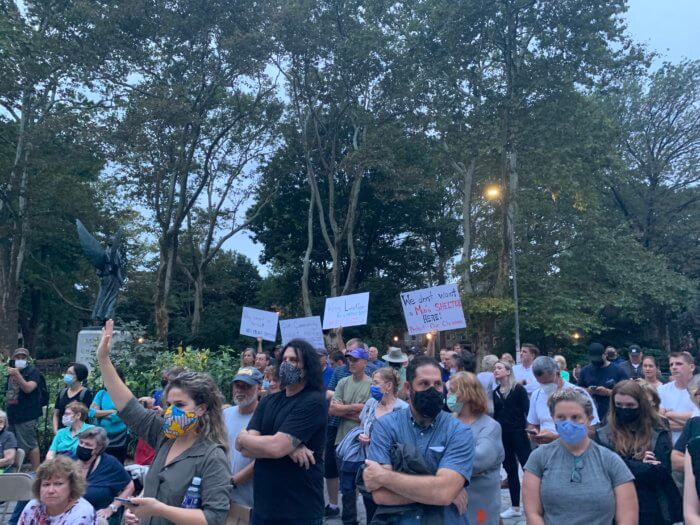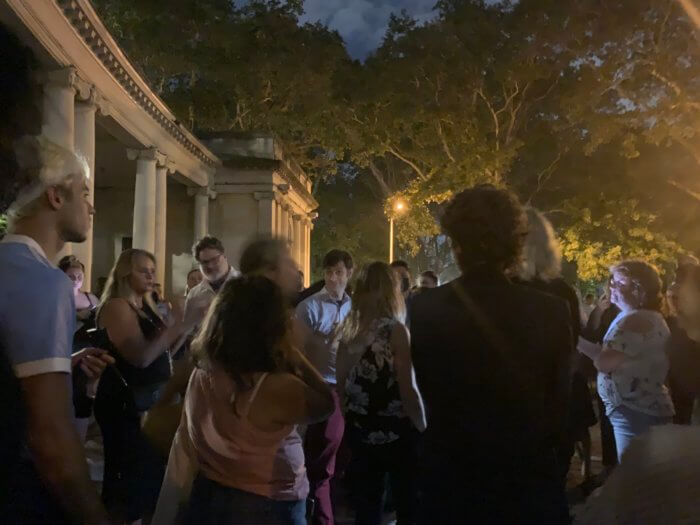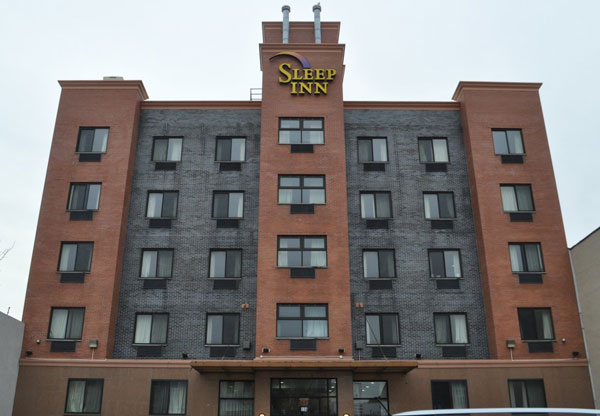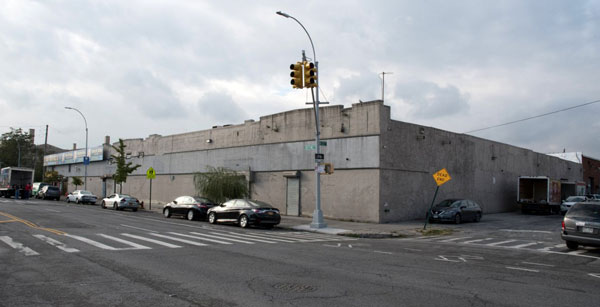Greenpoint residents huddled in McGolrick Park on Sept. 22 for a public meeting on a planned homeless shelter slated for Apollo Street — with many blasting the lack of community input, and hundreds more signing onto a petition opposing the plan.
The “Safe Haven” shelter would bring 145 beds for unhoused New Yorkers, and figures to be open sometime around the end of 2022.
Because shelters are considered an emergency resource in New York City, they are not subject to a high-level of public scrutiny, as other types of new structures are — and they can avoid the city’s lengthy Uniform Land Use Review Procedure altogether.
So, when news finally broke that permits for the shelter were approved in July, many neighbors felt that they’d been kept in the dark. Over 1,700 people subsequently signed an online petition opposing the shelter’s construction, and expressing frustration that no public hearings had been held.

The petition demands a response from local elected officials, Brooklyn’s Community Board 1, and “whoever else had anything to do with the okay of this project” — although neither the community board nor any local elected hold authority over the construction of shelters.
Councilmember Stephen Levin, who represents parts of northern Brooklyn, including Greenpoint, called the meeting after some constituents aired their grievances with the shelter at meetings of CB1 and the 94th Precinct Community Council.
Amie Pospisil, a rep of Breaking Ground, which is slated to operate the shelter upon its opening, joined Levin at the Wednesday night meeting, along with Erin Drinkwater from the city’s Department of Social Services, and Shane Cox, a deputy commissioner from the Department of Homeless Services.
“As a city councilmember, I don’t have a vote, there’s no approval,” Levin told the crowd on Wednesday night. “I’m being honest with you guys. I have approval over ULURP, which is rezonings. Councilmembers do not have an approval over the siting of shelters.”
“Why are you here, then?” one attendee yelled back.
Levin told Brooklyn Paper he had been notified that Breaking Ground was planning to open a new Safe Haven shelter around the time the permits were filed last December, but hadn’t been actively keeping up with the project’s development, and didn’t know the permits had been approved and that the project was officially moving into its next steps until last month.
Had he known earlier, Levin said, he would have held a meeting to discuss the shelter with the community.
“That’s a reasonable role of the city council member, is to convene the community when there’s something to present about,” he said. “I think the frustration of the community is that, they see it as, ‘OK, this is moving forward, when was the opportunity to stop it?’”
“The answer to that is that in the process that we have, there is not an opportunity for an outside entity to stop it, other than through a lawsuit. The city could cave to pressure, theoretically, but I’m not going to contribute to that pressure.”
Issues similar to the one playing out in Greenpoint have popped up around the city in recent years, as Mayor Bill de Blasio’s signature “Turning the Tide” initiative seeks to spread out shelter beds evenly across the Five Boroughs — a reversal of a Bloomberg-era policy to cluster shelters in cheap-to-build areas, which had the effect of gathering unhoused New Yorkers in low-income, majority-minority neighborhoods.
Levin, who chairs the council’s Committee on General Welfare, said he’s familiar with the work Breaking Ground has done in the district and throughout Brooklyn, having worked with them since before he was elected to the council.
“If it was a less reputable provider, a provider I didn’t know as well, I wouldn’t be as comfortable,” he said. “But I am very comfortable with Breaking Ground.”

Safe Haven shelters were developed as a way to provide shelter to homeless individuals who had avoided entering traditional shelter systems. They are less restrictive, allowing residents to come and go as they please without a curfew, and residents can miss a night without the shelter giving up their bed, according to Breaking Ground’s website.
“Clients are able to interact with social services workers, there’s less restriction, they’re entering into shelters,” Drinkwater said at Wednesday’s meeting. “This administration has added significant numbers of safe haven beds because, as the councilmember stated, we recognize that they play an important piece of the puzzle in solving homelessness.”
Pospisil explained that the Apollo Street shelter would have more than 50 staff members including security staff, on-site at all times, and staff members conduct “community patrols” around the building.
“We work with the community stakeholders at each location, because everyone is different, every neighborhood is different, every site is different, to engage with them to do community patrols whenever and wherever necessary,” she said.
Breaking Ground has been operating their street outreach program — the only one in the borough — since 2007.
Speakers were frequently drowned out by the crowd shouting, blowing whistles and ringing bells. As the meeting progressed, Levin had to ask attendees to step back, as they had created a tight circle around him, Cox, Drinkwater and Popisil, and NYPD officers had to step in to clear some space between the speakers and angry community members.
“I didn’t walk away from that meeting begrudging the community,” Levin said. “They were angry, they were upset, and they wanted to let me know, they wanted to let the city know how upset they were. That’s okay.”
But physically intimidating the speakers was not, he said, and next time, he will find a place that will allow some physical separation.
One neighbor, who declined to give her name, took the microphone to express her concerns about the shelter’s Apollo Street location and the number of people who would be staying there.
“We don’t know who’s going in there, we don’t know how many people are going to be there,” she said. “There’s 145 beds. I thought the shelter is supposed to be helping people in Greenpoint. We have 15 homeless men. Why do we need 145 beds? It does not make any sense.”
She was also concerned about how the building had been approved, given the lot’s zoning. According to the application, which lists the development as a “transient hotel,” 83 Apollo Street is zoned M1, “light manufacturing.” While a special permit is required for new hotel development in M1 districts, there is an exclusion for transient hotels “operated exclusively for the public purpose of temporary housing assistance.”
Others spoke out about the safety of their families and children if the shelter goes forward, saying they had seen homeless individuals going to the bathroom in public parks.
“How desperate would you have to be before you took a s–t in a park?” said Corwin Duncan. “And wouldn’t you want somewhere else to go? Wouldn’t you want a safe, clean place with services that could support you?”
Duncan, a Greenpoint resident who has previously worked with homeless individuals seeking employment, told Brooklyn Paper he’s thrilled to see more services becoming available for vulnerable Brooklynites.
“Coming here and seeing the outcry against this shelter, it terrifies me, it breaks my heart, and it infuriates me,” he said. “I think the deepest piece of this that is upsetting to me is that the people speaking out against this shelter don’t seem to understand that homeless members of our community are people. They’re humans.”
Those people are just seeking stability and safety, he said. He understands that his neighbors are both angry and fearful of the impact of the shelter, and said that changing that attitude requires “a fundamentally different way of looking at things.”
“People who don’t have a place to live right now are just that,” Duncan said. “Any of us with a few pieces of bad luck can end up there way more easily than we’d like to think. We’re all a lot closer to those people than we want to believe.”























